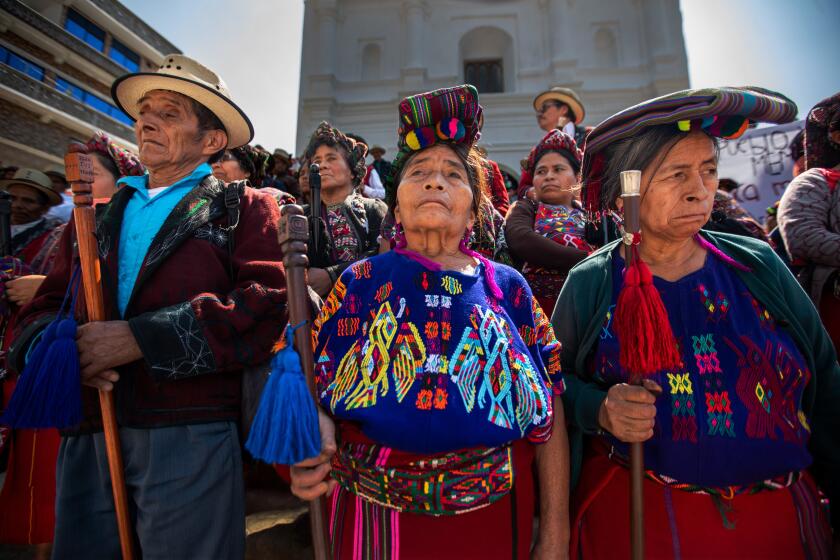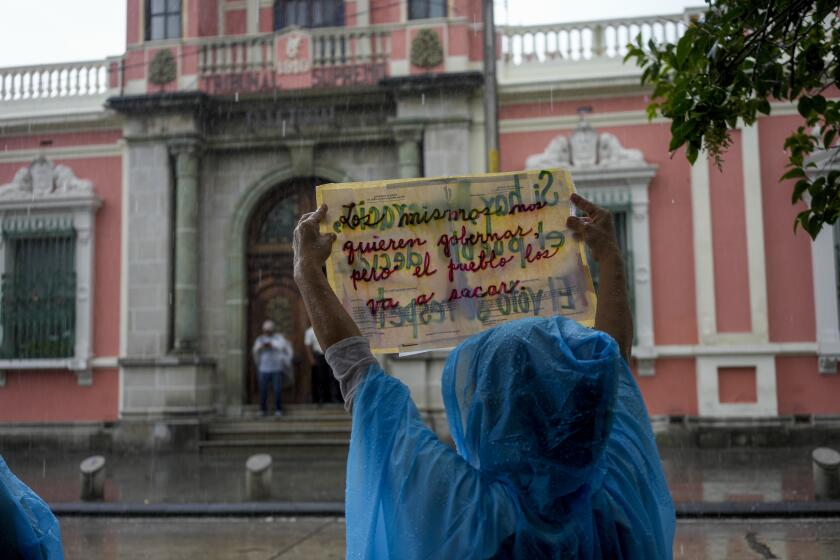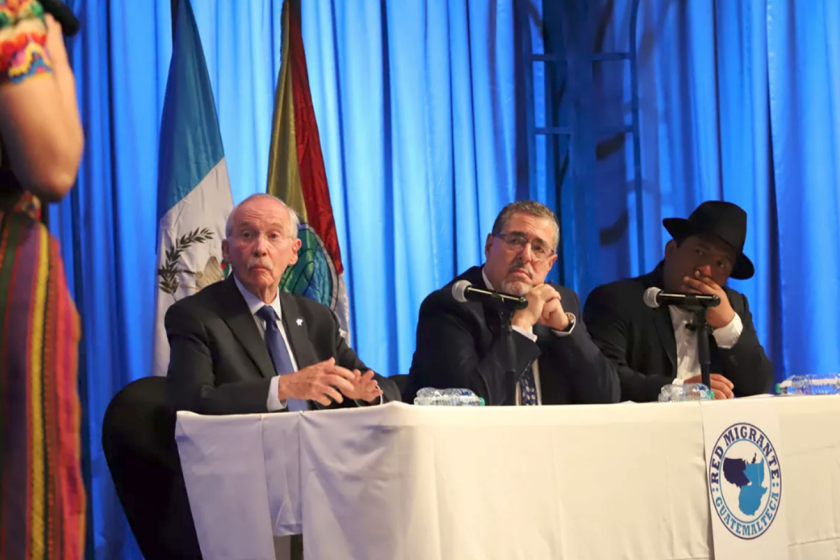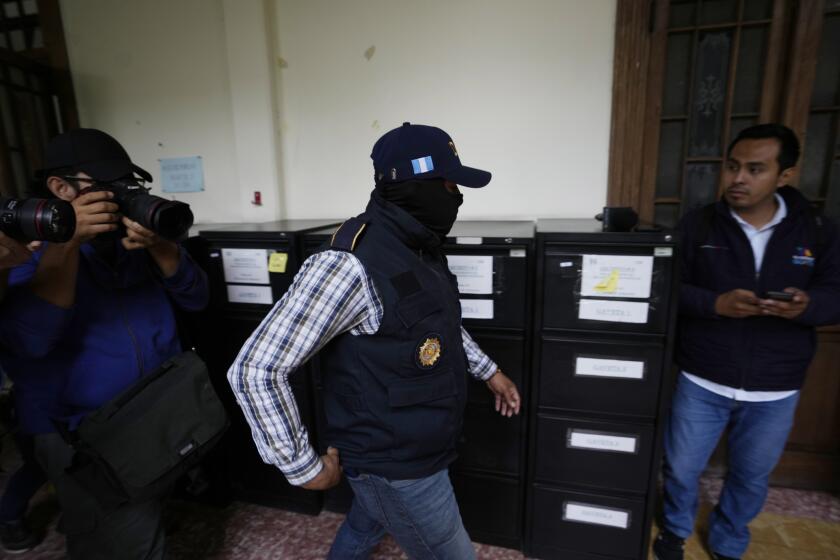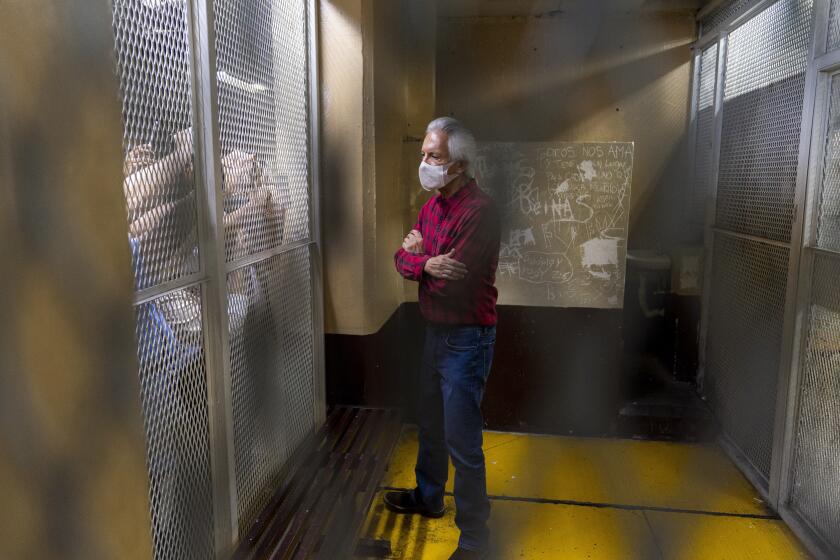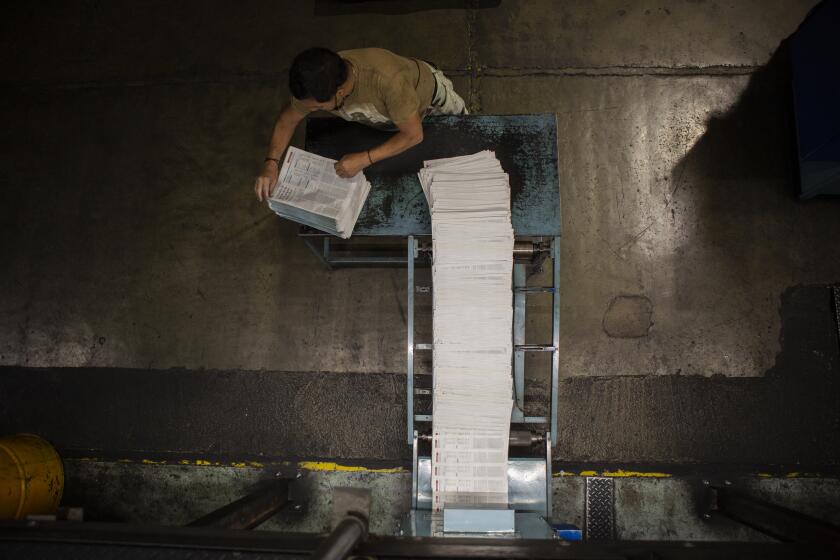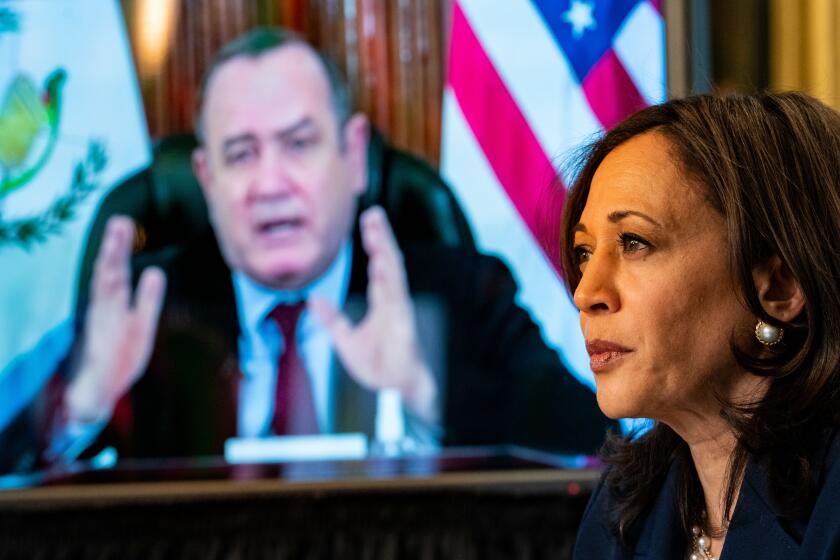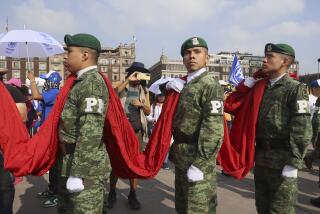Biden administration warns Guatemala against rejecting democracy in presidential election
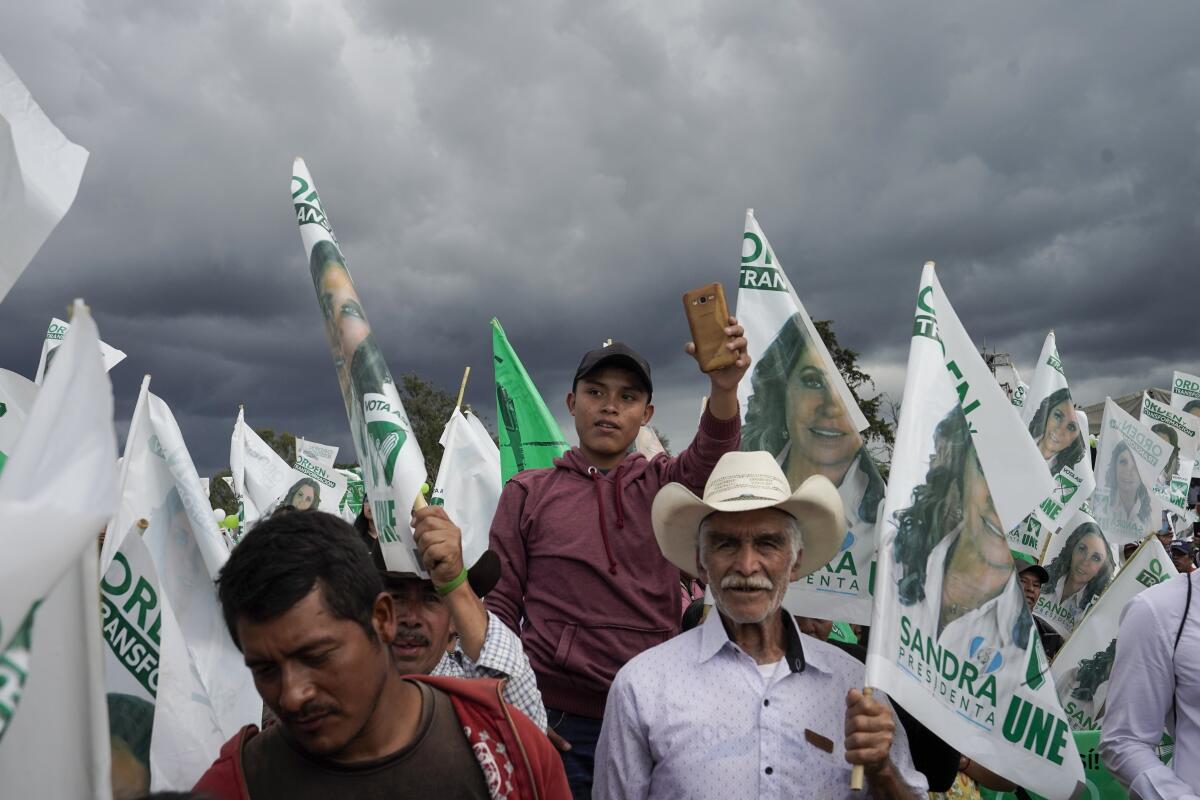
- Share via
WASHINGTON — Biden administration officials are working intently to prevent the Guatemalan government, one of their few allies in Central America, from overturning election results that put a leftist in next week’s presidential runoff — to the dismay of right-wing elites in that country who have long called the shots.
With persistent phone calls, in-person visits, public denouncements and sanctions on key people including Guatemala’s attorney general, U.S. officials are warning the country’s powerful military, political and business forces of the danger of subverting democracy.
On Sunday, Guatemalans will choose their next president from the two top vote-getters in a June 25 election: Sandra Torres, a conservative former first lady favored by the establishment who came in first, and Bernardo Arévalo, a left-of-center politician who campaigned against corruption and stunned the country by finishing a close second.
As soon as those results became clear, the power elite in the government and military jumped into action with numerous attempts to bar Arévalo from the runoff.
Courts controlled by the right wing in Guatemala attempted to invalidate Arévalo‘s political party and sent police to raid his offices. They have threatened legal action to challenge Arévalo‘s eligibility to be a candidate and delayed certification of the June 25 results. Several losing political parties, including that of President Alejandro Giammattei and another of the daughter of a military dictator convicted of genocide, filed unsubstantiated claims of fraud in the election.
For many longtime scholars of Latin America, the viability of democratic rule is at stake. Guatemala’s crossroads comes as El Salvador is abandoning democracy, Nicaragua’s rule of law is long gone and Honduras teeters on the brink. The emergence of yet another dictator in the region would be an embarrassment for the Biden administration, analysts say, making it important for the U.S. to show it still has leverage in the Western Hemisphere despite inroads made by China.
The daughter of a Guatemalan dictator convicted of genocide is running for president, raising questions about the nation’s memory of a brutal civil war.
The United States “is deeply concerned by efforts that interfere with the June 25 election result,” U.S. Secretary of State Antony J. Blinken said in a statement that was unusually strong in criticizing an ally’s election process. He warned against “actions to interfere with the election result” which, he said, “violate the spirit of Guatemala’s constitution and threaten the legitimacy of its democratic process.”
Washington was quickly joined by the European Union and the Organization of American States, showing rare unity to condemn the Guatemalan governmental actions. Both fielded nationwide observer missions for the June election, judging it a fair process.
Who prevails — the U.S. and the international community, or antidemocratic forces inside Guatemala — remains to be seen.
But the political turmoil of the last months highlighted what has been a steady backslide in Central America’s largest country. In a region awash in violence, poverty and corruption, Guatemala not so long ago appeared to be on a better path.
Fearing democracy is at risk, Guatemalans are posting certified election forms on social media to show there wasn’t fraud in the presidential vote.
With international support, serious corruption investigations were being conducted by Guatemalan prosecutors and judges, and important players, such as a former president, landed in jail.
Vice President Kamala Harris chose Guatemala as the lone Central American country she visited when the administration in its early days launched an initiative aimed at improving economic and political conditions in the region as a way to ease illegal immigration.
But Biden administration officials may have failed to notice that the tide had turned in Guatemala during the Trump era, with traditional economic and political elites in the country starting to reassert their control.
Until 2019, a widely praised United Nations-sponsored anticorruption investigatory body, the International Commission against Impunity in Guatemala, which was founded in 2006, had remarkable success fighting organized crime and corruption. Its work helped reduce homicides by 32%, dismantled 60 of Guatemala’s pervasive and destructive drug and trafficking cartels, and indicted more than 600 people, according to a 2018 analysis by the International Crisis Group.
In the Guatemalan presidential election June 25, immigrants in the U.S. can again choose who will be the next head of state of their nation of origin.
It also began to prosecute previously untouchable members of the elite, leading to the investigation of three former presidents, Otto Pérez Molina, Alfonso Portillo and Álvaro Colom (Portillo was extradited to the U.S. and sentenced to five years in prison) ; a vice president, Roxana Baldetti, and a first lady: current candidate Torres, who was jailed for a while until charges were dismissed.
In 2019, then-President Jimmy Morales, a former comedian and Christian evangelical who courted the favor of Trump and Republican conservatives, announced he was dismantling the commission. He declared its head, respected jurist Iván Velásquez, persona non grata and barred him from entering the country.
There was widespread outrage over Morales’ moves inside Guatemala, in the U.S. and in European capitals. But the Trump administration, generally dismissive of international cooperation and corruption probes, did not weigh in to support the commission.
The situation deteriorated from there, according to Guatemalan and U.S. analysts and current and former officials. Guatemala was back to business as usual, as one diplomat put it, with rampant corruption and a lack of accountability. Old-guard Guatemalan officials squashed the investigations and then went after anticorruption judges, forcing many to flee the country.
Guatemala’s political turmoil deepens as prosecutors targeted progressive presidential candidate Bernardo Arévalo before a runoff election.
Then, much like the approach of Trump officials, the Biden administration prioritized immigration cooperation over other issues and did little to reverse the backslide in Guatemala, said Ana María Méndez Dardón, a Guatemalan attorney who heads the Central America division at the Washington Office on Latin America.
As recently as earlier this year, senior U.S. officials were praising Guatemala and its president, Giammattei, as valuable partners, Méndez Dardón recalled.
“Now we see the consequences,” she said. “They didn’t see how corrupt the institutions were becoming.”
As judges were being run out of the country, the Giammattei government cracked down on nongovernmental organizations that work in development, human rights and civic education — actions also taken in autocratic countries like Russia — and on independent journalists.
News Alerts
Get breaking news, investigations, analysis and more signature journalism from the Los Angeles Times in your inbox.
You may occasionally receive promotional content from the Los Angeles Times.
One of Central America’s most respected journalists, José Rubén Zamora, the 66-year-old publisher of independent newspaper elPeriódico that probed corruption of high-level officials, was jailed this year and sentenced to six years in prison for money-laundering charges that the Committee to Protect Journalists has said are “shameful” false accusations.
Meanwhile, within segments of the GOP, support for Guatemalan officials has continued, despite their efforts to undo the election results.
At a Senate confirmation hearing late last month for Tobin John Bradley, the U.S. ambassador nominee for Guatemala, Republican Sen. Bill Hagerty of Tennessee challenged U.S. policy. He said he was “concerned” that the Biden administration “has created the perception that it’s picking sides” in the Guatemala election and that “we need to ... not be perceived as being in any way meddling with” the country’s electoral process.
And in an op-ed piece in the Miami Herald last month, Florida Sen. Marco Rubio referred to U.S. efforts in Guatemala as “the administration’s ideological persecution of democratically elected, pro-American governments.”
After the arrest of its president, Guatemala’s El Periodico newspaper lets all its reporters go and shuts down its print edition.
Although they had varying degrees of impact, there were steps the Biden administration did take to push back on the deterioration in Guatemala. Several dozen Guatemalan officials have been blacklisted by the State Department, which revoked their visas for travel to the United States or barred them from doing business with U.S. citizens.
Those sanctioned include the attorney general of Guatemala, Consuelo Porras, who is said to have close ties to Guatemala’s notorious military. She has led the way in attempting to overturn the June election result.
Eric Jacobstein, the deputy assistant secretary of State for Central America, said he believed the sanctions have impact and praised the Guatemalan public for standing up to Porras. Speaking at a forum sponsored by the Inter-American Dialogue earlier this month, he described her as “an attorney general whose job is to protect the Guatemalan people but has ultimately undermined that institution.”
Guatemalan-born Rep. Norma Torres (D-Pomona) is following the political drama and invited both candidates for meetings. Only Arévalo responded.
Under a law meant to crack down on violence against women, politicians obtain restraining orders to stop reporters from criticizing them or investigating corruption.
“I am very concerned about the runoff with everything the regime has done ... all to block a fair election with a popular candidate,” Torres said in an interview.
Even if Arévalo does not win, he will have succeeded in transforming his anticorruption political movement from a splinter group into an important player, said Bejamin Gedan, head of the Latin America program at the Wilson Center think tank in Washington.
“This gives them political and moral leverage, and sends a pretty powerful message that they have become a force to reckon with in Guatemala,” Gedan said.
U.S. officials also say that, in contrast to some periods in Guatemala’s recent history, segments of the country’s private sector support going ahead with the runoff election between Torres and Arévalo. Not that business leaders would like having a leftist president, but they do see the damage to Guatemala’s reputation, and ability to trade and do commerce with the U.S., if actions are seen as an undemocratic coup.
Recent attacks on Judge Miguel Ángel Gálvez are part of a broader campaign on Guatemala’s courts that have forced nearly two dozen judges and prosecutors into exile.
“There’s probably a recognition that using traditional institutions arbitrarily and politically is an authoritarian tactic,” a senior State Department official said in an interview, conducted on condition of anonymity to speak freely about behind-the-scenes discussions. “Not only in Latin America, [but] obviously Nicaragua. And I think the private sector recognizes that this is not a path that they want the country to go down.”
There is certain historical irony in the U.S. urging democracy in Guatemala today. In 1954, the Eisenhower administration sponsored a military coup in Guatemala that ousted the country’s democratically elected president, Jacobo Árbenz Guzmán, and set in motion decades of brutal military dictatorships. The military waged a genocidal 36-year civil war that killed tens of thousands of Indigenous Mayan Guatemalans.
Árbenz was the second democratically elected president. The first was Juan Jose Arévalo, the father of the current presidential candidate.
More to Read
Get the L.A. Times Politics newsletter
Deeply reported insights into legislation, politics and policy from Sacramento, Washington and beyond. In your inbox twice per week.
You may occasionally receive promotional content from the Los Angeles Times.
